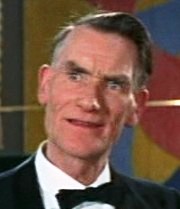Peter Blake was a Scottish actor. Probably best known as the character Kirk St Moritz in the BBC sitcom Dear John, by John Sullivan, his other high-profile moments came through his playing of a 'Fonz'-type character in Pepsi-Cola commercials which led to a hit record in 1977 "Lipsmackin' Rock 'n' Rollin", Andy Evol the disc-jockey in Agony with Maureen Lipman for LWT and in an episode of Taggart as Sgt. Bill Kent. He also had a long association with The Rocky Horror Show playing Frank-N-Furter over a thousand times between 1975 and 1994.

Epic theatre is a theatrical movement that arose in the early to mid-20th century from the theories and practice of a number of theatre practitioners who responded to the political climate of the time through the creation of new political dramas. Epic theatre is not meant to refer to the scale or the scope of the work, but rather to the form that it takes. Epic theatre emphasizes the audience's perspective and reaction to the piece through a variety of techniques that deliberately cause them to individually engage in a different way. The purpose of epic theatre is not to encourage an audience to suspend their disbelief, but rather to force them to see their world as it is.
The Scottish Renaissance was a mainly literary movement of the early to mid-20th century that can be seen as the Scottish version of modernism. It is sometimes referred to as the Scottish literary renaissance, although its influence went beyond literature into music, visual arts, and politics. The writers and artists of the Scottish Renaissance displayed a profound interest in both modern philosophy and technology, as well as incorporating folk influences, and a strong concern for the fate of Scotland's declining languages.

John Duncan Macrae was one of the leading Scottish actors of his generation. He worked mainly as a stage actor and also made five television appearances and seventeen films.
Higham Ronald Hayman was a British critic, dramatist, and writer who was best known as a biographer.

The Citizens Theatre, in what was the Royal Princess's Theatre, is the creation of James Bridie and playwright in residence Paul Vincent Carroll is based in Glasgow, Scotland, as a principal producing theatre. The theatre includes a 500-seat Main Auditorium, and has also included various studio theatres over time.

Theatre Intime is an entirely student-run dramatic arts not-for-profit organization operating out of the Hamilton Murray Theater at Princeton University. Intime receives no direct support from the university, and is entirely acted, produced, directed, teched and managed by a board of students that is elected once a semester. "Students manage every aspect of Theatre Intime, from choosing the plays to setting the ticket prices."
Robert Kemp (1908–1967) was a Scottish playwright. Along with Tom Fleming and Lennox Milne, he was a founder of the Edinburgh Gateway Company.
Thomas Kelman Fleming, FRSAMD was a Scottish actor, director, and poet, and a television and radio commentator for the BBC.

The Life of Edward II of England, also known as Edward II, is an adaptation by the German modernist playwright Bertolt Brecht of the 16th-century historical tragedy by Marlowe, The Troublesome Reign and Lamentable Death of Edward the Second, King of England, with the Tragical Fall of Proud Mortimer (c.1592). The play is set in England between 1307 and 1326. A prefatory note to the play reads:
Robert David MacDonald, known as David, was a Scottish playwright, translator and theatre director.
The Guthrie Theater is a center for theater performance, production, education, and professional training in Minneapolis, Minnesota. The following is a chronological list of the plays and performances that it has produced or presented. Production information from 1963 through the 2005–06 season is sourced primarily from The Guthrie Theater: Images, History, and Inside Stories and The Guthrie Theater.
The Scottish Theatre Company was started in 1980 under the direction of Dundee-born actor Ewan Hooper who had revived the Greenwich Theatre, London in 1969, but for most of its 8 years it was directed by his successor Tom Fleming. From its production base in Glasgow, where its home theatre was the Theatre Royal, it set out its policy of presenting Scottish and international classic drama, and commissioned new plays of Scottish drama. It was launched with a performance of Let Wives Tak Tent, Robert Kemp's translation into Scots of Molière's L'Ecole des Femmes, at the McRobert Centre at the University of Stirling on 16 March 1981. It toured nationally and appeared at the Edinburgh International Festival. The company represented British Theatre at the International Theatre Biennale in Warsaw in 1986 with Sir David Lyndsay's Ane Satyre of the Thrie Estaites.
Giles Pollock Havergal CBE is a theatre director and actor, opera stage director, teacher, and adaptor. He was artistic director of Glasgow's Citizens Theatre from 1969 until he stepped down in 2003, one of the triumvirate of directors at the theatre, alongside Philip Prowse and Robert David MacDonald.
The Open Fist Theatre is both a 501(c)(3) non-profit theatre company. Originally operating a 99-seat theatre facility in Theatre Row Hollywood located at 6209 Santa Monica Blvd, it is now in residence at the Atwater Village Theatre. The name of the Open Fist Theatre Company comes from two principles: the notion of an open spirit and the fist—a sign of determination and force.
Philip Prowse is a stage director and designer, and was one of the triumvirate of directors at the Citizens Theatre in Glasgow, Scotland, from 1970 until 2004.
Robert Trotter was a Scottish actor, director, and photographer.
The Gateway Theatre was a Category C listed building in Edinburgh, Scotland, situated on Elm Row at the top of Leith Walk.

John Breck (John Doyle) (24 December 1953 – 8 January 1984) was a Scottish actor of Irish-Italian parentage, born in Glasgow on 24 December 1953. His parents were Clara Zanotti Doyle and Alexander Doyle.
Derek Watson was a Scottish musicologist, actor, musician and bookseller. He has been described as a Scottish cultural icon.





